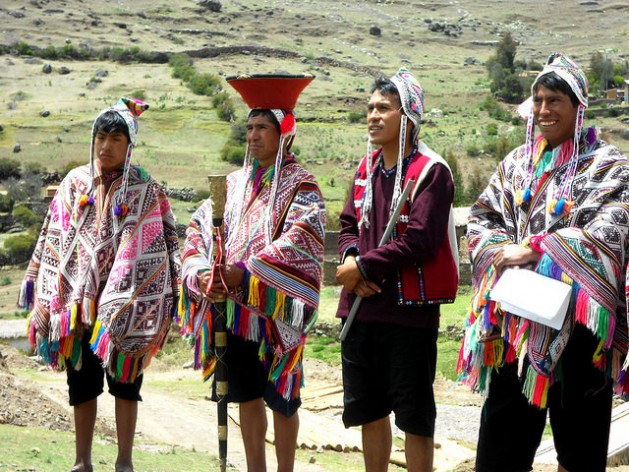Climate Change Threatens Quechua and Their Crops in Peruís Andes
Climate Change Threatens Quechua and Their Crops in Peru’s Andes
By Fabiola Ortiz

PISAC, Peru , Dec 29 2014 (IPS) - In this town in Peru’s highlands over 3,000 metres above sea level, in the mountains surrounding the Sacred Valley of the Incas, the Quechua Indians who have lived here since time immemorial are worried about threats to their potato crops from alterations in rainfall patterns and temperatures.
“The families’ food security is definitely at risk,” agricultural technician Lino Loayza told IPS. “The rainy season started in September, and the fields should be green, but it has only rained two or three days, and we’re really worried about the effects of the heat.” If the drought stretches on, as expected, “we won’t have a good harvest next year,” said Loayza, who is head of the Parque de la Papa or Potato Park, a biocultural conservation unit created to safeguard native crops in the rural municipality of Pisac in the southeastern department or region of Cuzco.
In the Parque de la Papa, which is at an altitude of up to 4,500 metres and covers 9,200 hectares, 6,000 indigenous villagers from five communities – Amaru, Chawaytire, Pampallaqta, Paru Paru and Sacaca – are preserving potatoes and biodiversity, along with their spiritual rites and traditional farming techniques.
The Parque de la Papa, a mosaic of fields that hold the greatest diversity of potatoes in the world, 1,460 varieties, was created in 2002 with the support of the Asociación Andes.This protected area in the Sacred Valley of the Incas is surrounded by lofty peaks known as ‘Apus’ or divine guardians of life, which until recently were snow-capped year-round.
“People are finally waking up to the problem of climate change. They’re starting to think about the future of life, the future of the family. What will the weather be like? Will we have food?” 50-year-old community leader Lino Mamani, one of the ‘papa arariwa’ – potato guardians, in Quechua – told IPS.
More:
http://www.ipsnews.net/2014/12/climate-change-threatens-quechua-and-their-crops-in-perus-andes/
